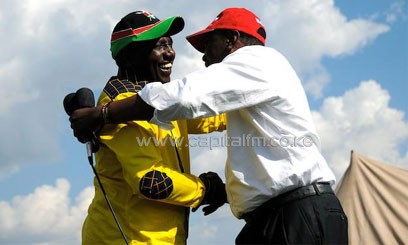
The former rivals are due to formally unveil their alliance at a rally Sunday at Nakuru, some 150 kilometres (95 miles) northwest of the capital Nairobi, one of the worst hit areas by the deadly 2007-2008 ethnic violence/FILE
But others more cynical see the deal between Deputy Prime Minister Uhuru Kenyatta and ex-minister William Ruto – both charged with crimes against humanity – as one of hard-nosed realpolitik rather than policy.
The former rivals are due to formally unveil their alliance at a rally Sunday at Nakuru, some 150 kilometres (95 miles) northwest of the capital Nairobi, one of the worst hit areas by the deadly 2007-2008 ethnic violence.
Kenyatta would run for president and Ruto likely run as his deputy, although this has yet to be confirmed.
“The problem has always been our leaders,” said Andrew Yatich, a local civil society leader in Nakuru working to heal divisions between the Kikuyu and Kalenjin tribes, who fought running battles in the last elections.
“If they work together, no doubt the war between the Kikuyu and Kalenjin will be a thing of the past,” he added.
Several presidential hopefuls are expected to unveil alliances ahead of a Tuesday deadline, including Kenyatta’s expected main challenger, Prime Minister Raila Odinga, himself a former ally of Ruto.
But Kenyatta and Ruto must also stand trial at the International Criminal Court (ICC) for their alleged role in having orchestrated the post-election unrest that killed at least 1,100 people and displaced more than 600,000.
Kenya, as a signatory of the Rome Statute of the ICC, would be forced to act on any arrest warrant issued by the court should the pair refuse to attend trial.
“The political alliance is a gimmick…the two individuals are in a marriage of convenience as both have questions to answer at the ICC,” said Macharia Munene, professor of politics at Nairobi’s United States International University.
The ICC trials, set to begin on April 10, could coincide with the elections, set for March 4, but which potentially could enter a second round vote within a month.
The violence shattered Kenya’s image as a beacon of stability in east Africa when the then-opposition leader Raila Odinga accused President Mwai Kibaki of rigging his way to re-election.
What began as political riots quickly turned into ethnic killings of Kibaki’s Kikuyu tribe, which launched reprisal attacks, plunging Kenya into its worst wave of violence since independence in 1963.
— ‘painful consequences’ if leaders win —
Kibaki, who is standing down after finishing his two-term limit, comes from the same Kikuyu ethnic group as Kenyatta, the son of Kenya’s founding president.
Leading human rights lawyer Maina Kiai, writing in the Daily Nation, warned of the “painful” consequences for ordinary Kenyans should the pair win, and doubting if so that they would attend the ICC trial in The Hague.
“It is almost crystal clear that if this ticket is declared the winner in the elections, the process of The Hague – which is about starting to end impunity – will be thwarted,” Kiai said.









































